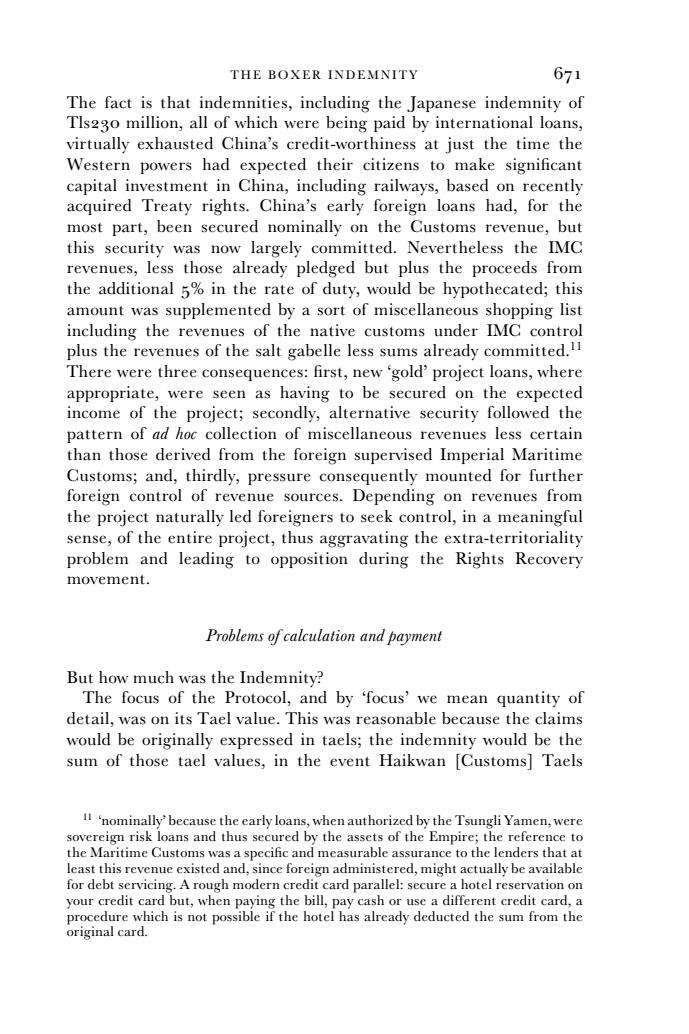正在加载图片...

THE BOXER INDEMNITY 671 The fact is that indemnities,including the Japanese indemnity of Tls230 million,all of which were being paid by international loans, virtually exhausted China's credit-worthiness at just the time the Western powers had expected their citizens to make significant capital investment in China,including railways,based on recently acquired Treaty rights.China's early foreign loans had,for the most part,been secured nominally on the Customs revenue,but this security was now largely committed.Nevertheless the IMC revenues,less those already pledged but plus the proceeds from the additional 5%in the rate of duty,would be hypothecated;this amount was supplemented by a sort of miscellaneous shopping list including the revenues of the native customs under IMC control plus the revenues of the salt gabelle less sums already committed.I1 There were three consequences:first,new 'gold'project loans,where appropriate,were seen as having to be secured on the expected income of the project;secondly,alternative security followed the pattern of ad hoc collection of miscellaneous revenues less certain than those derived from the foreign supervised Imperial Maritime Customs;and,thirdly,pressure consequently mounted for further foreign control of revenue sources.Depending on revenues from the project naturally led foreigners to seek control,in a meaningful sense,of the entire project,thus aggravating the extra-territoriality problem and leading to opposition during the Rights Recovery movement. Problems ofcalculation and payment But how much was the Indemnity? The focus of the Protocol,and by focus'we mean quantity of detail,was on its Tael value.This was reasonable because the claims would be originally expressed in taels;the indemnity would be the sum of those tael values,in the event Haikwan [Customs]Taels Inominally'because the early loans,when authorized by the Tsungli Yamen,were sovereign risk loans and thus secured by the assets of the Empire;the reference to the Maritime Customs was a specific and measurable assurance to the lenders that at least this revenue existed and,since foreign administered,might actually be available for debt servicing.A rough modern credit card parallel:secure a hotel reservation on your credit card but,when paying the bill,pay cash or use a different credit card,a procedure which is not possible if the hotel has already deducted the sum from the original card.THE BOXER INDEMNITY 671 The fact is that indemnities, including the Japanese indemnity of Tls230 million, all of which were being paid by international loans, virtually exhausted China’s credit-worthiness at just the time the Western powers had expected their citizens to make significant capital investment in China, including railways, based on recently acquired Treaty rights. China’s early foreign loans had, for the most part, been secured nominally on the Customs revenue, but this security was now largely committed. Nevertheless the IMC revenues, less those already pledged but plus the proceeds from the additional 5% in the rate of duty, would be hypothecated; this amount was supplemented by a sort of miscellaneous shopping list including the revenues of the native customs under IMC control plus the revenues of the salt gabelle less sums already committed.11 There were three consequences: first, new ‘gold’ project loans, where appropriate, were seen as having to be secured on the expected income of the project; secondly, alternative security followed the pattern of ad hoc collection of miscellaneous revenues less certain than those derived from the foreign supervised Imperial Maritime Customs; and, thirdly, pressure consequently mounted for further foreign control of revenue sources. Depending on revenues from the project naturally led foreigners to seek control, in a meaningful sense, of the entire project, thus aggravating the extra-territoriality problem and leading to opposition during the Rights Recovery movement. Problems of calculation and payment But how much was the Indemnity? The focus of the Protocol, and by ‘focus’ we mean quantity of detail, was on its Tael value. This was reasonable because the claims would be originally expressed in taels; the indemnity would be the sum of those tael values, in the event Haikwan [Customs] Taels 11 ‘nominally’ because the early loans, when authorized by the Tsungli Yamen, were sovereign risk loans and thus secured by the assets of the Empire; the reference to the Maritime Customs was a specific and measurable assurance to the lenders that at least this revenue existed and, since foreign administered, might actually be available for debt servicing. A rough modern credit card parallel: secure a hotel reservation on your credit card but, when paying the bill, pay cash or use a different credit card, a procedure which is not possible if the hotel has already deducted the sum from the original card